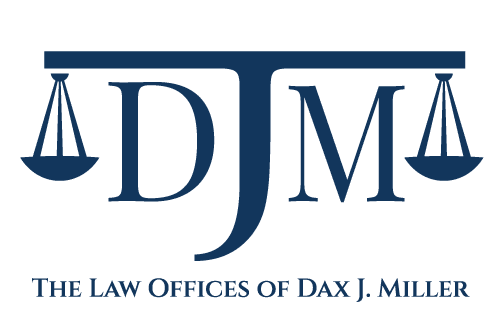To stop foreclosure, you must first understand what a foreclosure consists of. Foreclosure is the method by which a lender repossesses a home or other piece of real estate. Indiana is a judicial foreclosure state. This means that the bank or private lender must go through the Indiana court system to take a home or piece of real estate.
Filing for Chapter 7 or Chapter 13 Bankruptcy may prevent or postpone the foreclosure of your home depending on what your goals are and what your financial resources allow.Read on to learn more about how to stop foreclosure and when you are ready for your free consultation, contact The Law Offices of Dax J. Miller.
Filing Chapter 7 Bankruptcy to Stop Foreclosure
If you file Chapter 7 Bankruptcy to stop foreclosure, you can usually count on buying an extra four to six months worth of time in your home. There are factors that may shorten or lengthen this time frame, but, generally speaking, this is what the average is. After the Chapter 7 Bankruptcy has ended and you receive your discharge, you are no longer personally liable for the money you owed the lender on the house. However, your name is still technically on the deed as owner so the bank still has to go through the foreclosure process to reclaim the deed.
Many clients find that the banks are more likely to work with a homeowner who is no longer personally liable for the mortgage when it comes to making arrangements to save the home. This means you may be able to obtain moving expenses or even a loan modification. If you can obtain a loan modification after a chapter 7 discharge, that means you’ve wiped out all of your dischargeable debt AND you save your home. Learn more in your free consultation from The Law Offices of Dax J. Miller.
Filing Chapter 13 to Stop Foreclosure
If you file Chapter 13 Bankruptcy to stop foreclosure, it may come with an entire range of benefits.
First and foremost, Chapter 13 Bankruptcy may allow you to reinstate your mortgage. Reinstating your mortgage means you agree to pay the regular monthly mortgage payment plus the amount that you are behind over the next three to five years. Assuming the rest of your Chapter 13 Bankruptcy plan complies with the bankruptcy code, this is a relatively surefire way to save your home. Then, after the bankruptcy is over, you are legally current on your mortgage payment and there is a federal court order to prove it. Moreover, Chapter 13 Bankruptcy may also allow you to get rid of second and third mortgages leaving you with only your primary mortgage to pay. Perhaps most compelling is that you may even be able to completely pay off your mortgage through a Chapter 13 Bankruptcy.
One of the main benefits of filing the Chapter 13 Bankruptcy to save your home from foreclosure is to place the entire account under the supervision of your attorney and the Bankruptcy Court. This way, any penny or dime that the mortgage company tries to charge you comes under scrutiny. Where you might have been jerked around by the mortgage company before, that all ends the day you file your Chapter 13 Bankruptcy. They comply with the federal laws regulating the Chapter 13 Bankruptcy or they face sanctions and fines. Learn more in your free consultation from The Law Offices of Dax J. Miller.
Obtain a Loan Modification
Obtaining a mortgage loan modification to stop foreclosure means the bank agreed to change the terms of your loan. This normally results in you now being current on payments. To accomplish that, they can reduce your interest rate, reduce your principal, extend the length of your mortgage, or even put the amount you are behind on the back end of your loan as a balloon payment. Then, when that balloon payment comes due at the end of your loan, it basically forces you to refinance your loan to pay off the balloon payment.
Obtaining a loan modification typically involves a process very similar to the one you went through to purchase your home to begin with. The bank will require proof of income, bank statements, tax returns, proof of occupancy (utility bill) as well as information about your other assets and debts. Then the bank makes a determination as to whether they can offer you a modification to save your home. Many, but not all times, these offers result in a lower monthly payment which helps you to afford your mortgage going forward. Obtaining a loan modification means the bank now has no motivation, or legal grounds, to move forward with the foreclosure. You simply need to ensure that you comply with all other provisions of the mortgage documents including maintaining property insurance and paying your property taxes. The bank’s attorney will then likely file a notice of voluntary dismissal thereby ending the foreclosure. Learn more about how a loan modification can prevent a foreclosure in your free consultation from The Law Offices of Dax J. Miller.
Foreclosure Defense
If you need to avoid bankruptcy but would like to still stay in your home, foreclosure defense may achieve your goal. Foreclosure defense consists of defending against the bank in the state court action.The success of actually stopping foreclosure with foreclosure defense depends on your specific situation. Oftentimes, foreclosure defense simply buys you time to either obtain a loan modification or move out of your house.
It is important to know that when you hire an attorney to represent you, that attorney has a duty of candor and honesty to the court. He or she cannot file motions or pleadings in your foreclosure case simply to buy you time. There must be a legal, factual basis for the attorney to sign and file the document. Each person’s situation differs but we often find that foreclosure defense only serves to draw out the inevitable. Contact The Law Offices of Dax J. Miller to learn more about foreclosure defense at your free consultation.
Take Control Now
Your debt is the problem. The Law Offices of Dax J. Miller may be your solution. We offer UNLIMITED FREE consultations to ensure that you are comfortable and confident in your financial future. More importantly, we are LOCAL.



